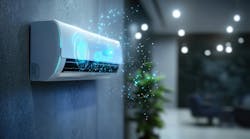When investigating building automation systems (BASs), it can be difficult to know what features you need, what system is best, or even what to ask system providers. The following questions will help you get the answers you need to make an educated decision.
Does it meet the needs of your facilities staff?
If your staff consists of dozens of engineers and technicians maintaining a large campus, you need to consider the capabilities of the system and all the tools and programs you'll need to support it. If your "staff" consists of one person who performs several functions at once, you may want to hire a vendor to provide the support and just focus on how your operator will use the system. Ask to see a demonstration of a system in a facility like yours. A system that works great for a large university may not be the best choice for an elementary school.
Is it easy to use?
Building managers spend much of their time scheduling occupancy, adjusting setpoints, troubleshooting complaints, and responding to alarms. These functions should be as easy and intuitive as possible, whether you're fine-tuning a single room or shutting down the entire building for a weather emergency. It should also be easy to check the system to see what schedules are in place, what setpoints are being used, and what points are "locked." Human nature being what it is, it's all too easy to make a quick change to meet an emergency condition and then forget to undo that change later. Make certain it's easy to find and adjust key settings. One of the fundamental rules of any BAS: If it's hard to do, it won't get done.
Can you access the system from where you need it?
Years ago, you needed a dedicated computer terminal to access a BAS. Now it's possible to access some systems from virtually anywhere using a browser, PDA, or cell phone. It's important to note, however, that "possible" doesn't mean it's free or that the interface will meet your needs. Make certain you can perform the activities you need through the interface you're buying.
Can you manage your energy program effectively?
Managing energy is fast becoming one of the most important functions of a BAS. Most systems have access to a great deal of energy data, but getting the data is only a small part of the challenge. Summarizing data in a concise, easy-to-understand manner and providing meaningful comparisons is critical. It's also important to be able to measure how effectively the energy is being used. In other words, is the energy you're using providing a healthful, comfortable, and productive indoor environment? We learned in the '70s that it was easy to save energy if you turned off lights and air-conditioning, and let people sweat in the dark. We also learned that this strategy wasted far more money in lost productivity than it saved in energy, destroyed morale, and simply didn't work in the long run. Look for a BAS that makes it easy to see, at a glance, how well the system performs and how much energy it uses.
Steve Tom is director of technical information for Kennesaw, GA-based Automated Logic Corp. (www.automatedlogic.com).

